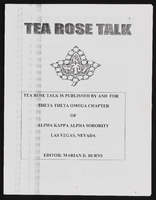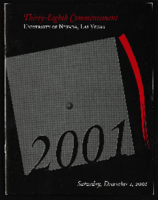Search the Special Collections and Archives Portal
Search Results
Kiel Family Photographs
Identifier
Abstract
The Kiel Family Photographs (approximately 1854-1989) contains glass plate negatives of members of the Kiel and George families, as well as neighbors from the Stewart and Wilson ranches and ranch workers. The majority of the photographs were taken at the Kiel Ranch site in North Las Vegas, Nevada. The collection consists of the original glass plate negatives, as well as photographic print and negative duplicates made using the originals.
Archival Collection
Vassili Sulich Photographs
Identifier
Abstract
The Vassili Sulich Photographs depict dancer and choreographer Vassili Sulich from 1950 to 2011. The photographs primarily depict Sulich dancing in ballets in France, Croatia, Germany, England, and the United States. The photographs also depict ballets choreographed or directed by Sulich at the Nevada Dance Theatre, which he founded in 1972 in Las Vegas, Nevada.
Archival Collection
Mike Smith Editorial Cartoons
Identifier
Abstract
The Mike Smith Editorial Cartoons (1980-2023) contain editorial cartoons created by Las Vegas, Nevada based cartoonist Mike Smith for the
Archival Collection
Blanche Zucker-Bozarth Papers
Identifier
Abstract
The Blanche Zucker-Bozarth Papers document education advocate Blanche Zucker-Bozarth's volunteer work and activism in libraries, children's advocacy, and women’s clubs in Las Vegas, Nevada from 1963 to 2005. The collection includes records, newspaper clippings, and photographs from her political activism and fundraising initiatives in Southern Nevada. The collection also includes buttons, video tapes, and journal articles on child abuse prevention, as well as records from Zucker-Bozarth's term as president of the Mesquite Club in the 1980s.
Archival Collection
Nevada Desert Experience Records
Identifier
Abstract
The Nevada Desert Experience Records (1951-2009) are comprised of files from the anti-nuclear organization, the Nevada Desert Experience (NDE), as well as its predecessor, the Sagebrush Alliance, and those of earlier unincorporated protests at the Nevada Test Site (NTS). Materials include board of directors meeting minutes, financial records, scrapbooks, personnel records, event speeches, correspondence, newspaper clippings, cartoons and other artwork, newsletters, brochures, fliers, research files on nuclear issues and other anti-nuclear organizations, and congressional testimony. The records also contain audiovisual materials, photographic prints and slides, screenplays, manuscripts, and newspapers related to the NDE's media efforts.
Archival Collection
Henry and Anita Schuster Papers
Identifier
Abstract
Collection is comprised of correspondence, speeches, essays, meeting minutes, photographs, research materials, publications, press clippings, awards, and event programs (1941-2011) that document the life of Henry Schuster, and his work with his wife Anita. Materials are mainly related to the Holocaust and to Holocaust memory and survivor organizations (especially the Holocaust Survivor's Group of Southern Nevada, which the couple founded, and L’Œuvre de Secours aux Enfants). Genealogical information is also included, as well as records of Henry Schuster’s time in the U.S. Army and his studies at the Manhattan Technical Institute.
Archival Collection
Pueblo Grande de Nevada Manuscript Collection
Identifier
Abstract
The Pueblo Grande de Nevada Manuscript Collection (1924-1983) contains journal articles, photocopies of artifact inventories, reports, correspondence, and field notes related to the Pueblo Grande de Nevada archaeological site located in the Overton Valley of Southern Nevada. The bulk of the materials are related to Mark R. Harrington's archaeological reports, journal articles, and data from sites throughout the Overton and Moapa valleys. The collection also includes materials related to the Boulder Dam Park Museum (Lost City Museum of Archaeology) located in Overton, Nevada, which housed many of the artifacts and photographs from Harrington's archaeological sites.
Archival Collection

Alpha Kappa Alpha Sorority, Theta Theta Omega Chapter "Tea Rose Talk" newsletters
Date
Archival Collection
Description
From the Alpha Kappa Alpha Sorority, Incorporated, Theta Theta Omega Chapter Records (MS-01014) -- Chapter records file.
Text

University of Nevada, Las Vegas (UNLV) 38th commencement program
Date
Archival Collection
Description
Commencement program from University of Nevada, Las Vegas Commencement Programs and Graduation Lists (UA-00115).
Text

Sook-ja Kim, February 12, 1996 and April 6, 1996: transcript
Date
Archival Collection
Description
The Kim Sisters, composed of three sisters, Sook-ja, Ai-ja, and Mia, came from Korea to Las Vegas in February 1959. Their first contract in America was to perform at the Thunderbird Hotel for four weeks as part of the China Doll Revue, the main showroom program. This engagement led to a successful career. Their popularity reached was at its height at the end of the 1960s when they performed throughout the United States and Europe. Sook-ja Kim is the oldest of the sisters. After his sister Ai-ja died in 1987, Sook-ja teamed up with her two brothers and continued to perform until 1989. Now semi-retired from show business, with occasional performances in Korea, she is working as a real estate agent. In this interview, she talked about her childhood, her career, and the family she has built since coming to America. Sook-ja was born in 1941 in Seoul, Korea as the third child of seven in a musical family. Her father was a conductor and her mother, a popular singer. After the Korean War, her mother arranged to send the Kim Sisters to America. When they came to Las Vegas, there were virtually no Koreans in the area. They depended on each other to take care of themselves. Some of the difficulties they had to adjust to in American were language, food, and cultural differences. Over the span of almost forty years in America, Sook-ja became acculturated without discarding her ethnic identity of family priorities. Her life-long guiding principle has been to adopt certain American values while continuing to keep her cherished Korean ethnic values. Through their performances, the Kim Sister informed the audience about Koreans and their culture. As the oldest of the group, Sook-ja was entrusted the care of her sisters, and later her brothers, the Kim brothers. Once she settled in Las Vegas, she brought more than forty members of her extended family to the city, contributing to the growth of the Las Vegas Korean community.
Text
